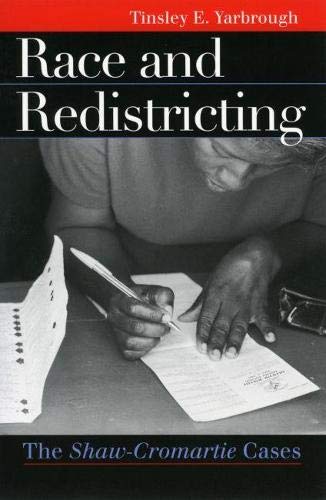University Press of Kansas
Race & Redistricting
Regular price
$7.95 USD
Regular price
Sale price
$7.95 USD
Unit price
per
Shipping calculated at checkout.
Couldn't load pickup availability
Title: Race & Redistricting
Author: Tinsley E Yarbrough
ISBN: 9780700612192
Publisher: University Press of Kansas
Published: 2002
Binding: Paperback
Language: English
Edition: Enlarged
Condition Note: Excellent, unmarked copy with little wear and tight binding. We ship in recyclable American-made mailers. 100% money-back guarantee on all orders.
Publisher Description: Through much of the 1990s, a newly hatched snake wreaked political havoc in the South. When North Carolina gained a seat in Congress following the 1990 census, it sought to rectify a long-standing failure to represent African American voters by creating, under federal pressure, two "majority-minority" voting districts. One of these snaked along Interstate 85 for nearly two hundred miles--not much wider than the road itself in some places--and was ridiculed by many as one of the least compact legislative districts ever proposed. From 1993 to 2001, three intertwined cases went before the Supreme Court that decided how far a state could go in establishing voting districts along racial lines. Noted Supreme Court biographer Tinsley Yarbrough examines these closely linked landmark cases to show how the Court addressed the constitutionality of redistricting within the volatile contexts of civil rights and partisan politics. A suit was first filed by Duke University law professor Robinson Everett, a liberal who loathed discrimination but considered racially motivated redistricting a clear violation of the Fourteenth Amendment's equal protection clause. Yarbrough tells how Everett enlisted associates as plaintiffs and went on to win two Supreme Court victories in Shaw v. Reno (1993) and Shaw v. Hunt (1996)--both by 5-4 decisions. Following the creation of another "flawed" redistricting plan, he rounded up a new set of plaintiffs to take the battle back to the Supreme Court. But this time, in Easley v. Cromartie--on the swing vote of Justice Sandra Day O'Connor--the 5-4 vote went against him. Yarbrough shows the significant impact these cases have had on election law and the fascinating interplay of law, politics, and human conflict that the dispute generated. Drawing heavily on court records and on interviews with attorneys on both sides of the litigation, he relates a complex and intriguing tale about these protracted struggles. His coge
Author: Tinsley E Yarbrough
ISBN: 9780700612192
Publisher: University Press of Kansas
Published: 2002
Binding: Paperback
Language: English
Edition: Enlarged
Condition Note: Excellent, unmarked copy with little wear and tight binding. We ship in recyclable American-made mailers. 100% money-back guarantee on all orders.
Publisher Description: Through much of the 1990s, a newly hatched snake wreaked political havoc in the South. When North Carolina gained a seat in Congress following the 1990 census, it sought to rectify a long-standing failure to represent African American voters by creating, under federal pressure, two "majority-minority" voting districts. One of these snaked along Interstate 85 for nearly two hundred miles--not much wider than the road itself in some places--and was ridiculed by many as one of the least compact legislative districts ever proposed. From 1993 to 2001, three intertwined cases went before the Supreme Court that decided how far a state could go in establishing voting districts along racial lines. Noted Supreme Court biographer Tinsley Yarbrough examines these closely linked landmark cases to show how the Court addressed the constitutionality of redistricting within the volatile contexts of civil rights and partisan politics. A suit was first filed by Duke University law professor Robinson Everett, a liberal who loathed discrimination but considered racially motivated redistricting a clear violation of the Fourteenth Amendment's equal protection clause. Yarbrough tells how Everett enlisted associates as plaintiffs and went on to win two Supreme Court victories in Shaw v. Reno (1993) and Shaw v. Hunt (1996)--both by 5-4 decisions. Following the creation of another "flawed" redistricting plan, he rounded up a new set of plaintiffs to take the battle back to the Supreme Court. But this time, in Easley v. Cromartie--on the swing vote of Justice Sandra Day O'Connor--the 5-4 vote went against him. Yarbrough shows the significant impact these cases have had on election law and the fascinating interplay of law, politics, and human conflict that the dispute generated. Drawing heavily on court records and on interviews with attorneys on both sides of the litigation, he relates a complex and intriguing tale about these protracted struggles. His coge

